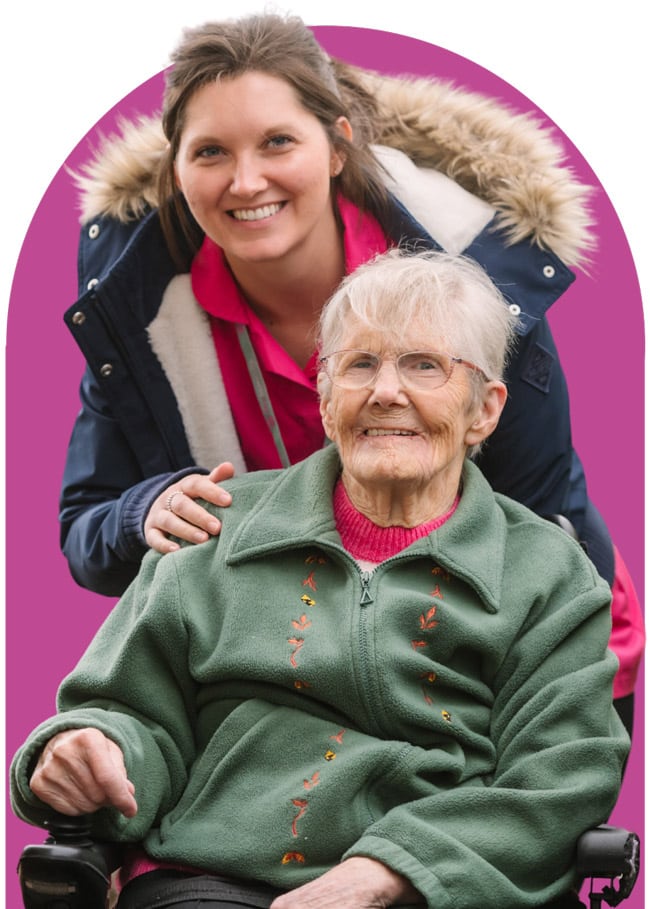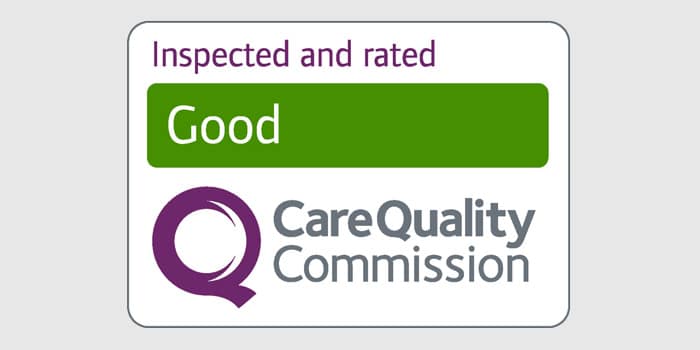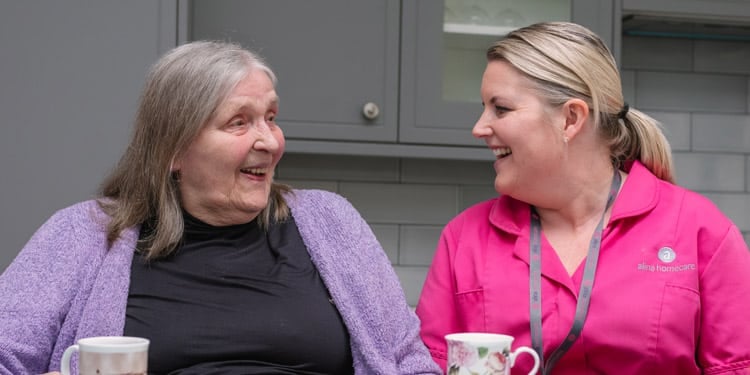Parkinson's Home Care
Find quality Parkinson’s Care in the comfort of your home.

What is Parkinson’s Home Care?
Our Parkinson’s Care at home supports you or your loved one with adapting to a diagnosis and managing symptoms. Our Home Care helps you to stay at home longer, without compromising on independence.
Delivered by professional Care Workers, our Parkinson’s Home Care service is all about you. We personalise your care, focussing on your needs, preferences and lifestyle. Whether you need help for a few hours a day or require longer periods of care, we make life easier.
A diagnosis of Parkinson’s is lifechanging, not just for the person receiving the diagnosis but also for their loved ones. However, a diagnosis doesn’t mean you cannot live well at home. Our Parkinson’s Care at home enables you to maintain as much independence and dignity as possible with the right level of support.
Find your local Alina Homecare Team to discuss your requirements and how we can support you or your loved one with Parkinson’s Care.

What does Parkinson’s Home Care include?
Receiving compassionate care in the familiarity, safety and comfort of the home can positively impact overall health and wellbeing. This can be especially true when compared to receiving Parkinson’s Care in a care home. In fact, one in six people living in nursing homes say they have no control over their daily lives.1
Our highly trained Care Workers are experienced in providing quality one to one care. With our support, living at home with Parkinson’s is not only possible but a great alternative to other types of care.
We’ll tailor your care and provide the necessary levels of support which meet your needs. We offer regular, short visits or 24 Hour Care at Home. Our fully managed service is holistic so you and your loved ones can always depend on us.
Anyone living with Parkinson’s knows symptoms can vary daily. On a good day, our friendly and remarkable Care Workers can be there to provide companionship over a cup of tea. On a tough day, they will be there to take the pressure from the daily routines so that you can concentrate on yourself – this could be anything from preparing meals to housework or shopping for essential items.
Whatever kind of day you experience, our Care Workers are ready to support you. They also provide emotional support if symptoms take a toll on mental health.
Parkinson’s
Live-in Care
Parkinson’s
Respite Care
Parkinson’s
Personal Care
Parkinson’s
Companion Care
On difficult days, sometimes all you need is a friendly face and a chat. Our Care Workers will happily take you on shopping trips or out and about in your local community. This service could also include looking after your pet and taking dogs for regular walks. Whatever you need, our Companion Care is sensitive and ensures privacy is always respected.
Why choose Alina Homecare?
How can Parkinson’s Home Care help?
Although there currently isn’t a cure for Parkinson’s, it can be managed with treatments and the help of specialists. Our Care Workers can be a highly valuable addition to yours or your loved one’s care team when help at home is needed.
Symptoms of Parkinson’s can vary from one person to another. Physical symptoms include tremors or shaking that can be uncontrollable, slowness of movement, rigidity or muscle stiffness and fatigue. Other symptoms which cannot be seen, but can be equally as debilitating, include bowel and bladder problems and disturbed sleep. Mental health problems, such as anxiety or depression, are also symptoms of Parkinson’s.
We work with you or your loved ones to develop a Parkinson’s Home Care plan that directly suits your personal needs. This involves customising the care required to the person’s abilities, interests, personality and history. Our care is always person centred, ensuring your or your loved one’s rights to respect are met every time.
Find your local Alina Homecare Team to discover which Home Care option is right for you.

Meet Jo, a Parkinson’s Care Manager
What are the advantages of Parkinson’s Care at Home?
Receiving Parkinson’s Care in the safety and familiarity of the home has many advantages, including:
Cost of Parkinson’s Home Care
The cost of Parkinson’s Care is dependent on the level of care and support required. This includes the services chosen, the frequency of care visits needed and where you live. Our expert Teams will conduct a comprehensive assessment of yours or your loved one’s needs at home to determine the type and amount of support required. There are also differences between the cost of Home Care and the cost of Live-in Care.
There are several ways to fund care. If you or your loved one has Parkinson’s, you may be eligible for benefits or other financial support from your local authority. Request a free quote using our costs calculator.
Quick questions
What is included with Parkinson’s Care at home?
Our highly personalised Parkinson’s Care at home service includes:
How much does Parkinson’s Home Care cost?
The cost of care varies depending on specific care needs and where you live. If you or your loved one requires continuous care, Live-in Care might be the most cost effective option. Our experienced Teams will conduct a comprehensive assessment of your needs to determine the level of support required.
Find your local Alina Homecare Team to discuss our costs in more detail.
How can I fund Home Care for Parkinson’s?
Most of our clients fund their care privately, but you may be eligible for benefits or other financial support. You can have a financial assessment to determine if you’re eligible for help towards the cost of care. Your local authority may fund care at home if you meet certain financial criteria.
If you are aged 64 and under and need help with personal care or have difficulty walking, you may be eligible for Personal Independence Payment (PIP). If you are at State Pension age or above, you may qualify for an Attendance Allowance.5
We have written a guide to funding Home Care to help you understand your options.
How can I arrange Parkinson’s Home Care?
Our friendly and experienced Teams are here to help you or your loved ones with Parkinson’s Care. Find your local Team to discuss how we can help.
What is Parkinson’s?
Parkinson’s is a progressive neurological condition, which is caused by problems in the brain and means symptoms deteriorate over time. People with Parkinson’s have a reduced ability to produce a chemical called dopamine because some nerve cells have stopped working. Dopamine plays a vital role in controlling muscle movement throughout the body. As a result of reduced dopamine production, the brain can’t send proper signals to muscles in the body, which then causes mobility issues.
Parkinson’s is one of the most common nervous system disorders of the elderly. In the UK, one in 50 people over the age of 65 have Parkinson’s and this number is expected to double by 2030.6
A Parkinson’s UK report published in 2018 using primary care data from 2015 found the following:
At this time, the exact cause of Parkinson’s remains unknown. Researchers suspect it’s a combination of reasons, including age, genetics and environmental factors that can cause the dopamine producing nerve cells to die.
Sadly, there is currently no cure for Parkinson’s. This means the level of support required by you or your loved one may potentially increase over time. We tailor our Parkinson’s Care plans to each person’s individual needs and constantly review them with you and your loved ones to ensure we continue to meet your requirements as and when they change.
How does Alina Homecare compare to an introductory agency?
Introductory agencies do not have to be regulated by the Care Quality Commission (CQC) and quality cannot be guaranteed. At Alina Homecare, we provide fully regulated services that are inspected by the CQC. We also provide training for our Parkinson’s Care Workers, whereas agency Carers may not complete any training. In addition to this, our services are managed locally; this means you can count on us when your Care Worker has time off, as our local Team will step in to ensure continuity of care.
What areas do you cover?
We provide care across the South of England. Find your local Alina Homecare Team today.
How is care monitored?
Like all our services, our Parkinson’s Home Care is regulated by the CQC. The CQC is an independent regulator that inspects our services to ensure our quality standards are maintained. This includes checking that our care is client focused and that we always keep you safe and secure.
In addition to this, we are proud to partner with Birdie. Birdie’s innovative care technology enables us to digitally log and monitor all the support we provide. The Birdie Family App, with your consent, also allows shared visibility of care at any time for you and your loved ones. It’s a great way of providing added reassurance that you’re receiving the highest quality care.
What training do you provide to your Carers?
At Alina Homecare, we have our very own Alina Homecare Academy. Our company is built on core values that we passionately believe in and are at the heart of everything we do. We ensure all our Care Workers receive the same high level of training so that our standards and quality reputation can be preserved.
Our expert Trainers all hold teaching qualifications and have a vast wealth of experience working in Health & Social Care. We offer several specialist qualifications for our Teams to equip them with greater knowledge to make life easier and safer for the people we support. We’re proud of our Alina Homecare Academy so we know our Care Workers are always delivering high quality care.
Contact us
1. The Live In Care Hub, “Better At Home”, Reviewed 9 June 2023
2. Aging Care, “Simplifying Daily Care for Someone with Parkinson’s Disease”, Reviewed 9 June 2023
3. Care Inspectorate, “Falls and fractures in care homes”, Reviewed 9 June 2023
4. Parkinson’s UK, “Information and support – Non-motor symptoms: Fatigue”, Reviewed 9 June 2023
5. NHS, “Living with Parkinson’s disease”, Reviewed 9 June 2023
6. NIHR, “People with late-stage Parkinson’s need personalised, flexible, home-based care”, Reviewed 9 June 2023
7. NICE, “Parkinson’s disease – Background information: Prevalence”, Reviewed 9 June 2023
Your Care Options





